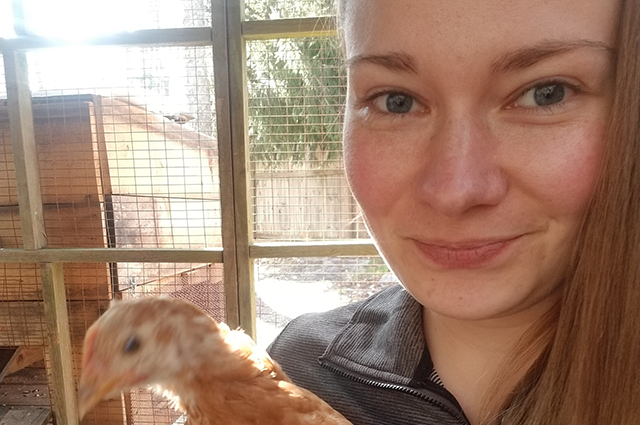Spotlight on Ashlee Junier

Fifth-year Genetics PhD student Ashlee Junier talks about her research, community involvement, and what she likes to bake. This interview has been edited for length and clarity.
How did you end up pursuing a PhD in Genetics, and why did you choose Tufts?
I had done some undergraduate research in the field, but the world of graduate school and getting a PhD was foreign to me. My undergraduate institution didn’t have any PhD programs. When my advisor suggested that I could get a PhD, I didn’t even know you could go straight from undergrad to grad school!
I started looking at PhD programs in Boston; I’m from Massachusetts, and I knew I wanted to be in the area. I basically just applied to every school in Boston! It was serendipitous that I ended up at GSBS; I actually submitted my application on the day of the deadline after realizing I had accidentally submitted my GRE scores here, rather than to the Graduate School of Arts and Sciences in Medford. When I realized my scores had gone to the wrong place, I found out GSBS was much more in line with what I wanted to do, so I applied on the day applications were due.
Can you give me a brief overview of your research?
I work in Carol Kumamoto’s lab in the Microbiology department. Our lab studies Candida albicans, which is a commensal organism, a yeast that lives as a part of our gut microbiota. While we’re not sure of its exact role in the gut, normally it doesn’t make you sick; sometimes, though it escapes and causes disease, especially in immunocompromised patients. No one knows what causes that switch from happy resident organism to pathogen. I study one of the pathways we think is involved in the change from its commensal form to its pathogenic form.
You’re the outgoing GSC (Graduate Student Council) Vice President, a TUNECC (Tufts New England Case Competition) executive, and a member of TBBC (Tufts Biomedical Business Club) and GWiSE (Graduate Women in Science and Engineering). Did I miss anything?
I’m the chair of TUNECC. My official title with TBBC is Vice President of Marketing. For GWiSE, I’m just a general member; I don’t have a particularly active role in the organization.
What motivated you to be a part of so many organizations, and what is your favorite thing you’ve done as part of a student organization?
I’ve always liked to stay busy and be involved with a lot of things. In undergrad, I was always doing a million things at once; I was a triple major! And a lot of these organizations are useful for my future career as well, so I’m getting multiple things out of it.
I got involved in TBBC after going to a career panel my first year. At the panel, they talked about this study group that sounded relevant to my interests, so I decided to go. When the person running it found out I was a first-year, they came up with a bunch of things for me to do, and I’ve been involved ever since. I really like being part of TBBC and helping other students figure out what to do with their careers; the group fills a gap for students who are interested in what used to be called ‘alternative careers’. Some of the faculty might not have the expertise to help with that, so TBBC can step in.
My favorite thing I’ve done was helping to orchestrate last year’s Relays, which is regarded as one of the most successful relays to date. It was a ton of fun to be out there and see the whole day come together knowing I had a pretty big hand in making everything run smoothly. It also helped that my team – Immunogenetics – won!
How do you balance the demands of wet lab work with all your community commitments?
It comes down to prioritizing what is most important, and not spending my time doing things that aren’t. Being involved in all these different organizations, there’s a lot of delegation: what do I need to do myself, what can I look to others to do? I try to be as organized as possible and not let things slip through the cracks, whether than means having lots of lists, or a calendar and a planner. Writing things down is helpful; you can look at a list and think, what’s the top priority with lab work, what do I need to do for the different organizations, can I read papers or send emails on the train, what needs to happen in the lab and what can be done at home?
What is one thing you do for fun that isn’t related to a student organization or your work as a scientist?
Just one?
Or more than one. I’m just surprised you have time for more.
I work with yeast, so to fill the void when I can’t go into the lab, I’ve been experimenting with sourdough. I made one bad loaf and one good pizza crust. Then I moved on to cupcakes and haven’t looked back.
I bake a lot. I mostly do iced cookies, and I’m getting into cupcakes and marshmallows. I’ve also started an apartment garden and am trying to grow some vegetables. And I hike. So mostly just cooking, baking, and hiking.